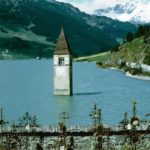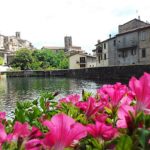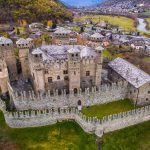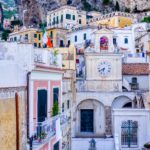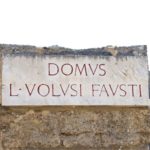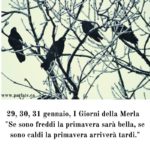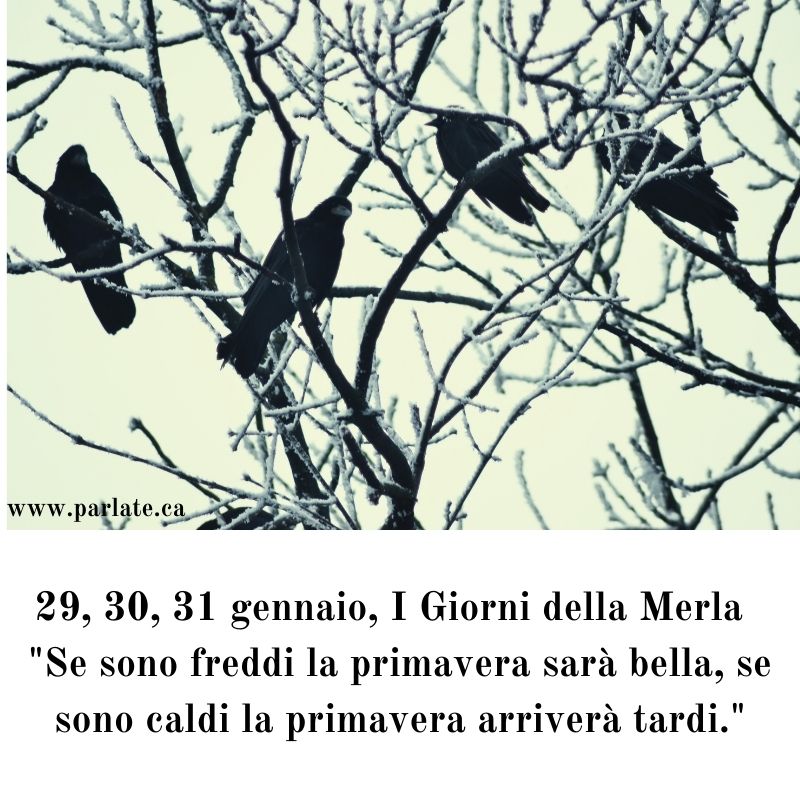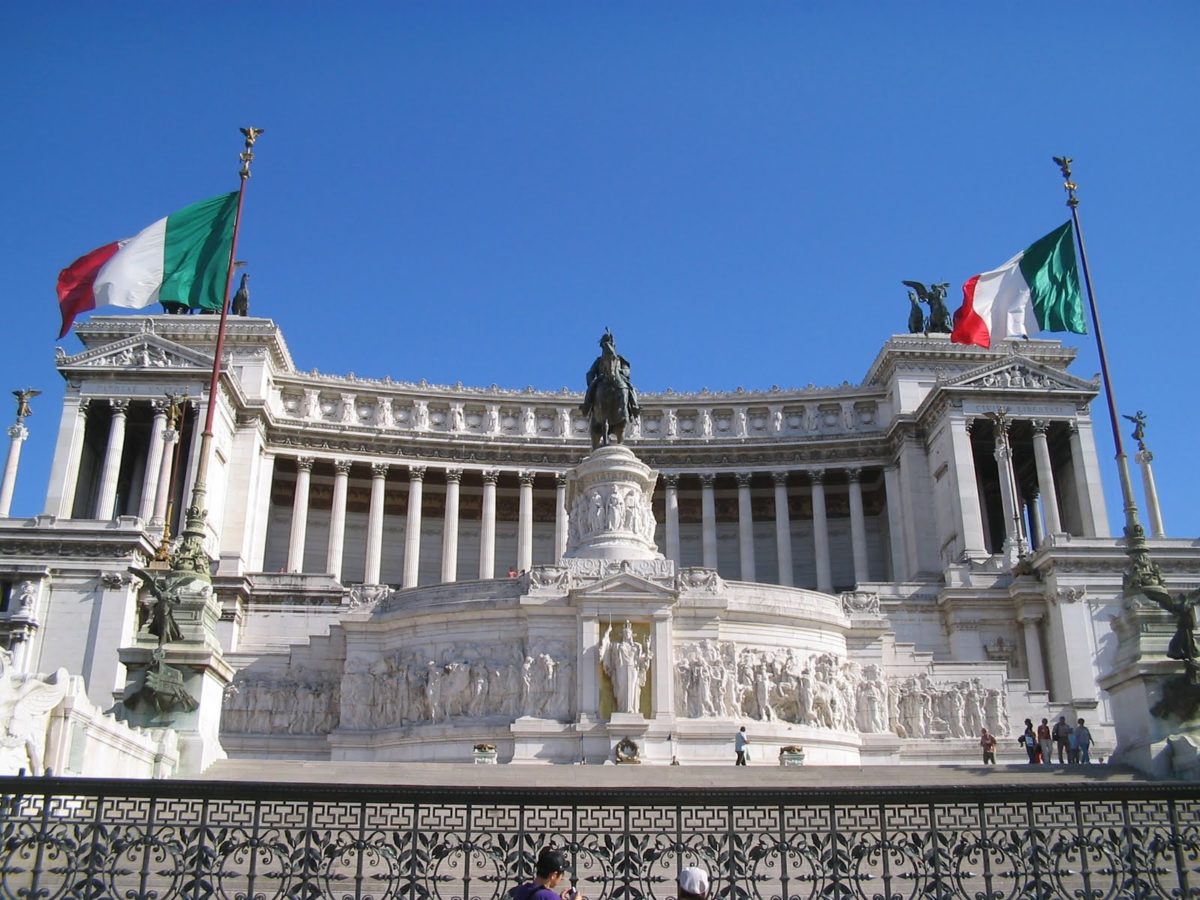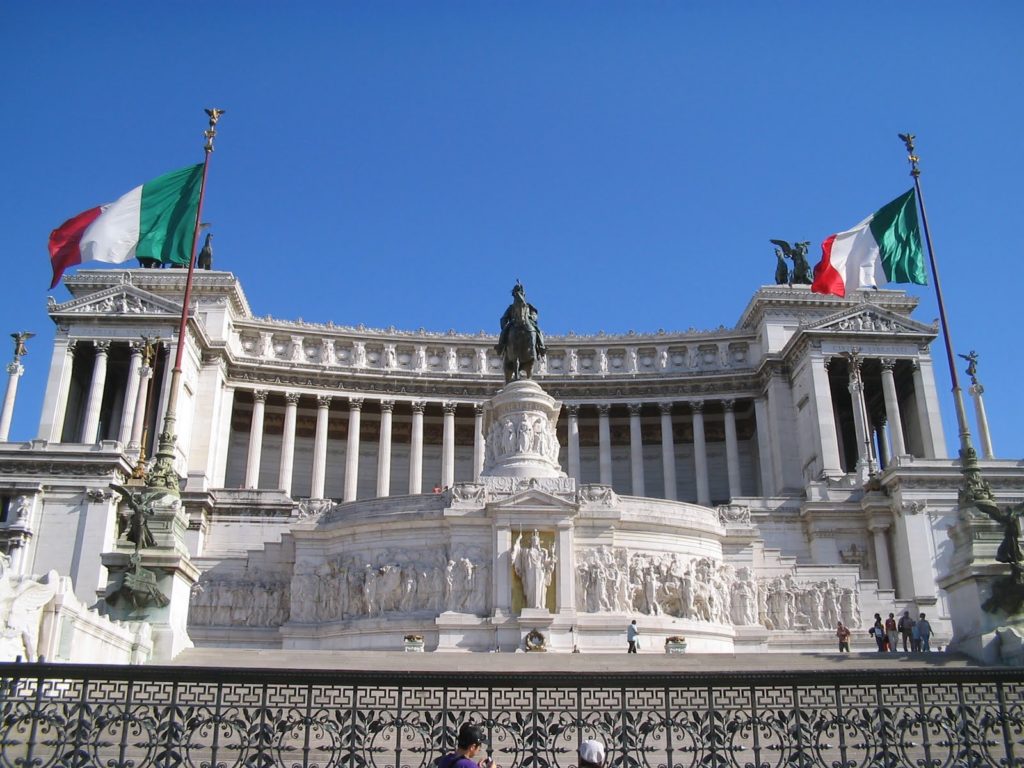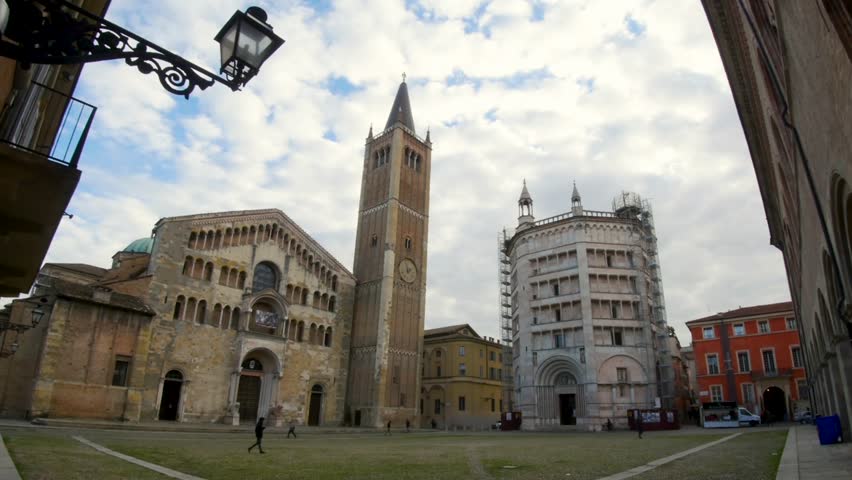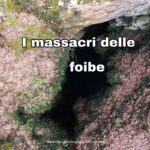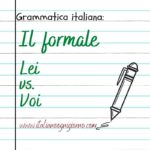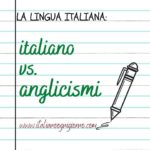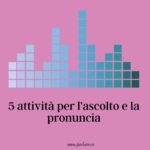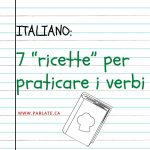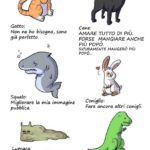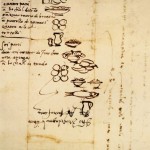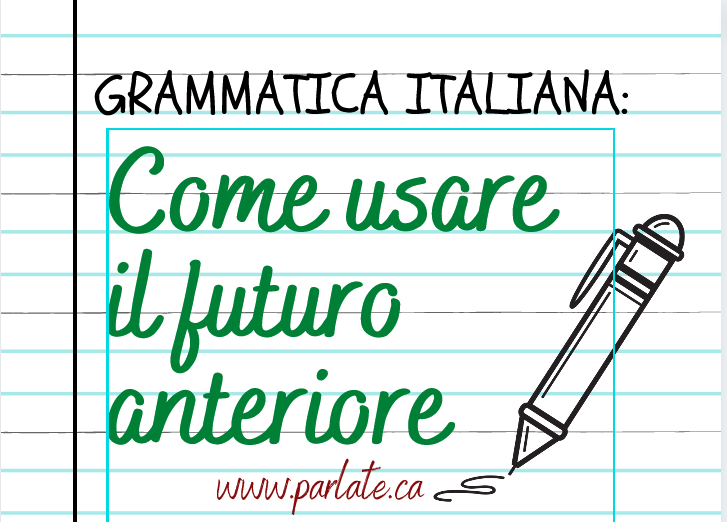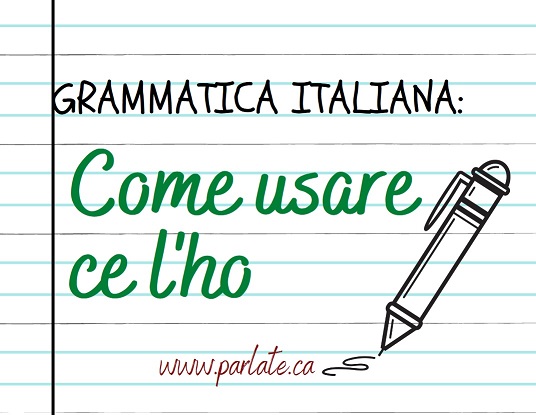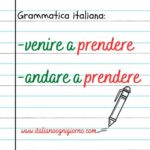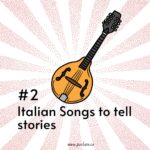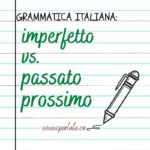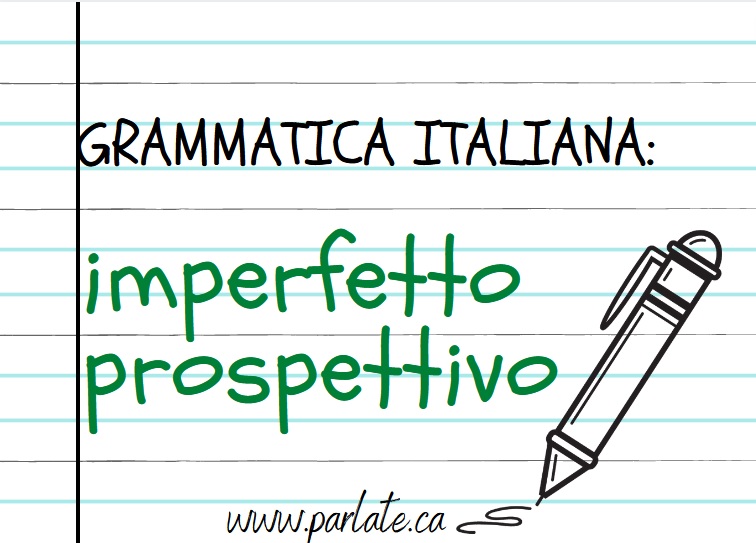Scrolla giù e scrivi una frase con la parola del giorno nei commenti.
Scroll down and write a sentence with the word of the day in the comments.
PAROLA DEL GIORNO:
139. la madia – the cupboard (sostantivo) / Le conserve di frutta erano riposte nella madia. – The fruit preserves were placed in the cupboard.
138. l’udito- hearing (sostantivo) / Alcuni animali hanno un udito potente. – Some animals have powerful hearing.
137. l’occhiolino – the wink (sostantivo) / Il cameriere della pizzeria faceva sempre l’occhiolino alle ragazze. – The waiter at the pizzeria used to always wink at the girls.
136. duttile – ductile, flexible (aggettivo) / La lettura e lo studio rendono la mente duttile. – Reading and studying make the mind ductile.
135. il nido – the nest (sostantivo) / Abbiamo scorto un nido di rondine in cima all’albero. – We spotted a swallow’s nest at the top of the tree.
134. il laccio – the lace (sostantivo) /Inciamperai con quel laccio sciolto! – You’ll trip with that loose lace!
133. Unto- greasy (aggettivo) /Non riuscirai ad aprire la bottiglia con le mani unte. -You won’t be able to open the bottle with greasy hands.
132. il macigno – boulder (sostantivo) / Nella vita alcuni eventi ci appaiono come macigni difficili da spostare. – In life some events appear to us like boulders that are difficult to move.
131. abbiente – wealthy (aggettivo) / I suoi zii abbienti hanno finanziato il suo mutuo sulla casa. – His wealthy uncle and aunt financed his home mortgage.
130. d’altronde – on the other hand, besides (avverbio) / Noi siamo arrivati in tempo, voi d’altronde ci avete fatto aspettare un’ora! – We arrived in time, you on the other hand, made us wait an hour!
129. la ninna nanna – the lullaby (sostantivo) / La nonna le cantava una ninna nanna per farla addormentare. – Her grandmother sang her a lullaby to put her to sleep.
128. estenuato – exhausted (aggettivo) / Gli scalatori saranno estenuati dopo l’arrampicata sulle Dolomiti. – The climbers will be exhausted after climbing the Dolomites.
127. urgere – to require, urge (verbo) / La situazione urge una decisione rapida. – The situation requires a quick decision.
126. l’affronto – affront, insult (sostantivo) / La sua candidatura sarebbe un affronto alla democrazia. – His candidacy would be an affront to democracy.
125. la cute – the skin (sostantivo) / Per l’arrossamento della cute ho applicato una crema lenitiva. – For the redness of the skin I applied a soothing cream.
124. lezioso – coy, simpering (aggettivo) / Fortunatamente non è risucito ad appassionare il pubblico con il suo discorso lezioso. – Fortunately he was unable to excite the audience with his affected speech.
123. bacato – buggy (aggettivo) / Si può dire una mela bacata, ma anche una testa bacata. – You can say a buggy apple, but also a buggy head.
122. il dorso – the back (sostantivo) / Portavano i sacchi sul dorso durante il pellegrinaggio. – They carried the bags on their backs during the pilgrimage.
121. la guarnizione – the seal, gasket (sostantivo) / Si era staccata la guarnizione del frigorifero. – The refrigerator seal had come off.
120. esoso – expensive (aggettivo) / Uscire a cena spesso sarebbe esoso per molti. – Going out to dinner often would be expensive for many.
119. Odierno – present-day (aggettivo) / Gli elettrodomestici odierni semplificano la vita. – Present-day appliances make life easier.
118. tutt’altro che – anything but (pronome indefinito) / Dormire sul treno era tutt’altro che comodo. – Sleeping on the train was anything but comfortable.
117. la zolla – the lump, sod (sostantivo) / Metteva sempre una zolla di zucchero nel caffè. – He always put a lump of sugar in his coffee.
116. l’orpello – the frill, tinsel (sostantivo) / Viveva in una casa di buon gusto e priva di orpelli. – She lived in a tasteful and frill-free house.
115. lerciare- to filth (verbo) / Non lerciare il tappeto con le tue scarpe fangose. -Don’t filth the carpet with your muddy shoes.
114. madido – damp (aggettivo) / Saremo madidi dopo l’allenamento in palestra. – We will be soaked after training in the gym.
113. evincere – to deduce (verbo) / Bisogna evincere delle indicazioni dai risultati. – Indications must be deduced from the results.
112. gualcire – to wrinkle (verbo) / Sedendosi sul divano, ha gualcito il vestito. -Sitting on the sofa, he wrinkled his suit.
111. nipponico – japanese (aggettivo) / I treni nipponici sono all’avanguardia. – Japanese trains are cutting edge.
110. la guglia – the shire (sostantivo) / In lontananza si vedevano le guglie maestose della cattedrale. – The majestic spires of the cathedral could be seen in the distance.
109. calante – waning (aggettivo) / La trasmissione sta avendo una popolarità calante. – The show is having waning popularity.
108. il manicaretto – the delicacy (sostantivo) / L’oste ha preparato una varietà di manicaretti per gli invitati. – The host prepared a variety of delicacies for the guests.
107. accorato – heartfelt (aggettivo) /Ci ha colpito l’accorato messaggio dei soccorritori. – We were struck by the heartfelt message of the rescuers.
106. uggioso – gloomy (aggettivo) / Il tempo uggioso ha lasciato il campo alle belle giornate. – The gloomy weather gave way to beautiful days.
105. lo zigomo – cheekbone (sostantivo) / Il truccatore valorizzava gli zigomi alti dell’attrice. – The makeup artist enhanced the actress’ high cheekbones.
104. l’edicola – newsstand (sostantivo) / E’ conveniente per il pensionato avere l’edicola sotto casa. – It is convenient for the pensioner to have a newsstand under his home.
103. mozzafiato – breathtaking / L’eclisse totale era mozzafiato. – The total eclipse was breathtaking.
102. eccelso – excelled (verbo) / Studiando giorno e notte hanno eccelso nelle loro prove. – Studying day and night they excelled in their tests.
101. flebile – weak (aggettivo) / Dopo l’influenza mi sono sentita flebile per alcuni giorni. – After the flu, I felt weak for a few days.
100. il vicinato – the neighborhood (sostantivo) / Ci vorrebbero più alberi nel nostro vicinato. – We could use more trees in our neighborhood.
99. diamine – geez (interiezione) / Diamine, soffia molto forte il vento oggi! – Geez, the wind is blowing very strong today!
98. l’obbrobrio – the eyesore (sostantivo) / Molti concordano che il ponte sullo Stretto di Messina sarà un obbrobrio. – Many agree that the bridge over the Strait of Messina will be an eyesore.
97. fatidico – fateful (aggettivo) / E’ giunto il fatidico giorno dell’esame di fine anno. – The fateful day of the end-of-year exam has arrived.
96. ebbene – so, well (congiunzione) / Mi avevi chiesto un consiglio, ebbene, eccolo! – You asked me for advice, well, here it is!
95. beffardo /a – derisive, mocking (aggettivo) / Le sue parole e il suo sorriso beffardo non incutevano fiducia. – His words and his mocking smile did not inspire confidence.
94. la quisquilia – the trifle, nonsense (sostantivo) / Non ne potevo più di sentire inutili quisquiglie. – I couldn’t stand hearing useless trifles any longer.
93. il crepuscolo – the dusk (sostantivo) / Le creature notturne escono al crepuscolo. – Nocturnal creatures come out at dusk.
92. tutelare – to protect (verbo) / Ci vogliono leggi che tutelino i diritti dei lavoratori. – Laws that protect workers’ rights are needed.
91. la cronaca nera – crime news (sostantivo) / Il telegiornale tratta soprattutto la cronaca nera. – The TV news mainly covers crime news.
90. cogliere – to seize (verbo) / Cogli l’attimo fuggente! – Seize the fleeting moment!
89. appetibile – appetizing, palatable (verbo) / Era poco appetibile la torta salata surgelata di quella marca. – That brand’s frozen savory pie wanot very appetizing.
88. lo scorcio – the glimpse (sostantivo) / Dalla finestra della stanza si vedeva uno scorcio della montagna. – From the window of the room you could see a glimpse of the mountain.
87. rinfrancare – to reassure (verbo) / Ci ha rinfrancato che lo sciopero dei treni è stato annullato. – We were reassured that the train strike had been called off.
86. avvilirsi – to get discouraged (verbo) / Non avvilirti se non ottieni il massimo voto all’esame. – Don’t be discouraged if you don’t get the best grade in the exam.
85. l’illogicità – the illogicality (sostantivo) / Era evidente a tutti l’illogicità della riforma economica. – The illogicality of the economic reform was evident to everyone.
84. dare per assodato – to take for granted (verbo) / Sbagliando, abbiamo dato per assodato la correttezza delle notizie diffuse sui giornali. – Wrongly, we took for granted the correctness of the news published in the newspapers.
83. l’indigenza – the poverty (sostantivo) / L’indifferenza verso l’indigenza è un segno di regresso della nostra società. – Indifference to poverty is a sign of regression in our society.
82. viandante – wayfarer, pedestrian (sostantivo) / Nelle vie di quella città il numero di viandanti è maggiore di quello delle auto. – In the streets of that city the number of wayfarers that of cars.
81. rappresa/o – thickened (aggettivo) / Dopo 30 minuti di cottura la polenta sarà rappresa. – After 30 minutes of cooking, the polenta will have thickened.
80. sferrare – to strike (verbo) / Nessuno si aspettava che avrebbe sferrato un colpo basso. – No one expected him to strike a low blow.
79. annaspare – to gasp (verbo) /Annaspavamo mentre salivamo le scale del campanile. – We gasped as we climbed the stairs of the bell tower.
78. il groviglio – the tangle (sostantivo) / Si osservano le prime fioriture nel groviglio dei rami primaverili. – The first blooms are observed in the tangle of spring branches.
77. il remo – the oar (sostantivo) / Se avessero avuto due remi, sarebbe stato più facile remare. – If they had two oars, it would have been easier to row.
76. ameno – delightful (aggettivo) / Avendo un pollice verde, il vicino ha sempre un giardino ameno. – Having a green thumb, the neighbor always has a pleasant garden.
75. la casupola – the small house (sostantivo) / Nel villaggio vi erano solo una decina di casupole. – There were only about ten small houses in the village.
74. lo screzio – the disagreement (sostantivo) / I due coinquilini avevano spesso degli screzi. – The two roommates often had disagreements.
73. L’imbarco – the boarding (sostantivo / Un treno dell’aeroporto ci trasporterà alla nostra zona d’imbarco. – An airport train will transport us to our boarding area.
72. l’alimento – the food (sostantivo) / Per sicurezza farei una scorta degli alimenti essenziali. – To be safe, I would stock up on essential foods.
71. inglobare – to include (verbo) / Sebbene la sfilata di moda abbia inglobato stilisti diversi, non mi ha colpito più di tanto. – Although the fashion show included different designers, it didn’t impress me too much.
70. il fragore – the noise (sostantivo) / La caduta della pianta dalla mensola ha causato un forte fragore. – The plant falling from the shelf caused a loud noise.
69. allettante – tempting (aggettivo)/ Essendo la sua proposta allettante l’ho accettata senza riserve. – Since his proposal was tempting, I accepted it without reservations.
68. irreprensibile – irreproachable (aggettivo) / Se avesse avuto una condotta irreprensibile, avrebbe ottenuto la promozione. – If he had been of irreproachable conduct, he would have gotten the promotion.
67. sbrodato – messed up (aggettivo) / La tovaglia era tutta sbrodata con il sugo di pomodoro. – The tablecloth was all messed up with tomato sauce.
66. le elucubrazioni – the ruminations (sostantivo) / Ha ascoltato con interesse le mie elucubrazioni sul tema. – He listened with interest to my ruminations on the topic.
65. voluttario – superfluous (aggettivo) / In questo periodo evitiamo spese voluttarie. – During this time we avoid superfluous expenses.
64. affibbiare – to affix, saddle (verbo) / Volevano affibbiarci tutte le mansioni, ma mi ci siamo opposti. – They wanted to saddle us with all the tasks, but we opposed.
63. la risma – the stack, ream (sostantivo) / Mi serviva una risma di fogli per la fotocopiatrice. – I needed a stack of paper for the photocopier.
62. impressionante – impressive (aggettivo) / Il Duomo di Milano è la più grande e impressionante chiesa gotica d’Italia. – Milan Cathedral is the largest and most impressive Gothic church in Italy.
61. il vertice – the summit (sostantivo) / Pare che il vertice dei produttori di vini italiani si terrà a settembre. – It seems that the summit of Italian wine producers will be held in September.
60. lo sgabello – the stool (sostantivo) / Se ci fossero più sgabelli potremmo sederci tutti. – If there were more stools we could all sit.
59. forbito – polished (aggettivo) / Il giovane studioso si esprimeva in un italiano forbito. – The young scholar spoke in polished Italian.
58. collimare – to coincide (verbo) / Le sue idee collimavano perfettamente con quelle dei suoi colleghi. – His ideas coincided perfectly with those of his colleagues.
57. spiccare – to stand out (verbo) / Gli studenti di questa scuola spiccano per la loro bravura nelle lingue. – Students at this school stand out for their proficiency in languages.
56. lo strato – the layer (sostantivo) / Stamattina abbiamo preparato una torta di compleanno con due strati di crema al cioccolato. – This morning we made a birthday cake with two layers of chocolate cream.
55. la lena – the energy (sostantivo) / Studiavano di buona lena per due ore ogni giorno. – They studied with energy for two hours every day.
54. capitolare – to surrender (verbo) / La sconfitta era prevedibile spingendo il candidato a capitolare. – The defeat was predictable prompting the candidate to surrender.
53. captare – to understand, pick up (verbo) / C’era un’interferenza durante la chiamata e di conseguenza abbiamo captato solo poche parole. – There was interference during the call and as a result we only picked up a few words.
52. la stampa – the print (sostantivo) / Sotto la giacca indossava una camicia a stampa geometrica. – Under the jacket He wore a geometric-print shirt.
51. scurire – to darken (verbo) / Secondo me hanno sbagliato a scurire il colore delle pareti. – In my opinion, they made a mistake in darkening the color of the walls.
50. disdicevole – disgraceful (aggettivo) / Nel paesino consideravano le sue scelte anticonformiste disdicevoli. – In the village they considered her non-conformist choices disgraceful.
49. erogare – dispense, provide (verbo) / I servizi erogati variano da Comune a Comune. – The services provided vary from municipality to municipality.
48. sparuto – haggard (aggettivo)/ Aveva un aspetto sparuto dove aver passato una notte insonne lavorando. – He looked haggard after spending a sleepless night working.
47. il docente – lecturer (sostantivo) / Avremmo capito meglio gli eventi odierni, se i docenti di storia ci avessero insegnato la storia contemporanea. – We would have understood today’s events better if history teachers had taught us contemporary history.
46. rancoroso – resentful (aggettivo) / Si vive male quando si conserva un cuore rancoroso. – You live badly when you keep a resentful heart.
45. la lungimiranza – the foresight (sostantivo) / Nonostante gli ostacoli economici, ha avuto successo grazie alla sua lungimiranza. – Despite financial obstacles, she succeeded thanks to her foresight.
44. originario – native of (aggettivo) / Al supermercato si trova soprattutto verdura originaria dell’Italia. – In the supermarket you can mostly find vegetables originating from Italy.
43. l’ustione – the burn (of the skin) (sostantivo) / Evito il sole nelle ore calde altrimenti avrò delle ustioni. – I avoid the sun during hot hours otherwise I will get burns.
42. scorazzare – to scamper (verbo) / Abbiamo scorrazzato per i vicoli della città. – We scampered through the alleys of the city.
41. l’impennata – the surge (sostantivo) / I prezzi dei viveri hanno subito un’impennata. – Food prices have soared.
40. il lampadario – the chandelier (sostantivo)/ Sono stati installati i lampadari l’altro ieri nella nuova casa. – The chandeliers were installed the day before yesterday in the new house.
39. sbatacchiata – tossed (aggettivo) / Nella folla della stazione mi sentivo sbatacchiata e destra e sinistra. – In the crowd at the station I felt tossed left and right.
38. lo stipendio – the salary (sostantivo) / Ricevendo un salario medio alto riesce a reinvestire i suoi guadagni. – By receiving a medium-high salary she is able to reinvest her earnings.
37. concedere – to grant (verbo)/ L’insegnante ha ci ha concesso altre due giorni per completare il progetto. – The teacher gave us two more days to complete the project.
36. il ruscello – the stream (sostantivo) / Scorre un piccolo ruscello nel bosco. – A small stream flows in the woods.
35. arcigno – grim (aggettivo)/ L’insegnante di storia alle scuole superiori era severa e arcigna. – The history teacher in high school was stern and sullen.
34. il governante – the housekeeper (sostantivo) / Avrebbero bisogno di una governante per gestire meglio la casa. – They would need a housekeeper to manage the house better.
33. la scocciatura – the nuisance (sostantivo) / E’ una gran scocciatura dover cambiare due treni per arrivare a destinazione. – It’s a big nuisance having to change two trains to reach the destination.
32. raccapricciante – horrifying (aggettivo) / Preferisco che tu non mi racconti i particolari raccapriccianti della sciagura. – I prefer that you don’t tell me the gruesome details of the disaster.
31. le scartoffie – the paperwork (sostantivo) / Ho passato il pomeriggio a mettere in ordine tutte le scartoffie. – I spent the afternoon getting all the paperwork in order.
30. di soppiatto – stealthily (avverbio) / E’ partita di soppiatto senza informare nessuno. – She left stealthily without informing anyone.
29. a bruciapelo – point blank (aggettivo) / Non ci aspettavamo una domanda a bruciapelo! – We didn’t expect a point-blank question!
28. il motivo – the pattern (sostantivo) / La camicia del signore aveva un motivo geometrico. – The man’s shirt had a geometric pattern.
27. prestare soccorso – provide assistance (verbo) / Siamo accorsi a prestare soccorso all’uomo ferito da due aggressori nella piazza. – We rushed to provide assistance to the man injured by two attackers in the square.
26. il docente – the teacher (sostantivo) / L’assemblea dei docenti si terrà tra tre giorni. – The teachers’ meeting will be held in three days.
25. il verdetto – the verdict (sostanntivo) / La giuria ha emesso il verdetto finale all’unanimità. – The jury delivered the final verdict unanimously.
24. lo sciacallo – the looter, jackal (sostantivo)/ Durante la protesta alcuni sciacalli hanno preso di mira i negozi. – During the protest some looters targeted the shops.
23. il cartello – the sign (sostantivo) / La città era cosparsa di cartelli elettorali. – The city was dotted with election signs.
22. fintanto che – as long as (congiunzione)/ Metteremo le nostre valigie nel bagagliaio fintanto che ci sara’ spazio. – We will put our luggage in the trunk as long as there is room.
21. man mano – gradually (avverbio)/ Aggiungi acqua all’impasto man mano che mescoli gli ingredienti. – Add water to the mixture as you mix the ingredients.
20. sgarrare – to mess up, fail (verbo) / Essendo la nostra ultima opportunità per passare la prova non possiamo assolutamente sgarrare. – Since this is our last opportunity to pass the test, we absolutely cannot fail.
19. il disboscamento – the deforestation (sostantivo)/ Nuove leggi saranno introdotte per proibire il disboscamento. – New laws will be introduced to prohibit deforestation.
18. appunto – exactly (avverbio)/ Dobbiamo sbrigarci appunto perché siamo in ritardo. – We have to hurry exactly because we’re late.
17.sghignazzare – sneer, giggle (verbo) / Io e le mie amiche fummo rimproverate perché sghignazzavano spesso durante la lezione. -My friends and I were scolded for laughing often during class.
16. la foggia – the style (sostantivo) / Gli abiti da cerimonia erano in tante fogge diverse. -The formal dresses came in many different styles.
15. programmare – to plan (verbo) / Gli organizzatori hanno programmato gli eventi per la settimana della cultura. -The organizers have planned the events for the week of culture
14. l’arazzo – the tapestry (sostantivo)/ Ho trovato in un negozio d’antiquariato l’arazzo appeso alla parete. – I found the tapestry hanging on the wall in an antique shop.
13. ragguardevole -remarkable (aggettivo)/ La biblioteca nazionale custodisce un numero ragguardevole di scritti antichi. – The national library holds a considerable number of ancient writings.14. arazzo –
12. la foga – the enthusiasm, heat (sostantivo)/ Abbiamo mangiato tutti i pasticcini presi nella foga del momento. – We ate all the pastries we got in the heat of the moment.
11. l’assegno – the cheque (sostantivo)/ Oggigiorno non si usano più gli assegni per i pagamenti nei negozi. – Nowadays, checks are no longer used for payments in stores.
10. spazzare via – sweep away (verbo)/ Il forte vento degli ultimi giorni ha spazzato via il fumo degli incendi. – The strong winds of the past few days have swept away the smoke from the fires.
9. il brano – the song, literary piece (sostantivo)/ In classe potremmo leggere un brano dell’antologia. – In class we could read a passage from the anthology.
8. il fulcro – the hub (sostantivo)/ Una volta la città di Firenze era il fulcro degli scambi commerciali. – In the past the city of Florence was the hub of trade.
7. lo scansafatiche – the slacker (sostantivo) / Quello scansafatiche di tuo fratello non fa niente dalla mattina alla sera. – Your slacker brother does nothing from morning to night.
6. la rata – the installment (sostantivo)/ Pagheremo il costosissimo schermo in due rate. – We will pay for the very expensive screen in two installments.
5. smorzare – to muffle, dampen (verbo) / Per smorzare la luce che entra dalla finestra bisogna tirare le tende. – To dampen the light coming in through the window you need to draw the curtains.
4. la bravura – the skill, cleverness (sostantivo) / Con la sua bravura imprenditoriale e’ riuscito ad esportare i suoi prodotti all’estero. – With his entrepreneurial skill he managed to export his products abroad.
3. l’anteprima – the preview (sostantivo) / Ci hanno regalato dei biglietti per andare all’anteprima del film. – They gave us tickets to go to the movie preview.
2. la scorza – the zest (sostantivo)/ Bisogna aggiungere la scorza di un’arancia alla ricetta. – You need to add the zest of an orange to the recipe.
1. mansueto – gentle, tame (aggettivo) / I bambini sono diventati mansueti guardando i cartoni animati. – Children have become tame by watching cartoons.
